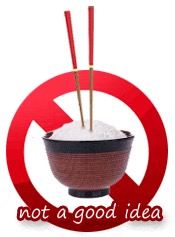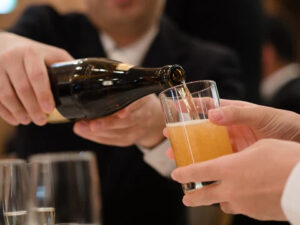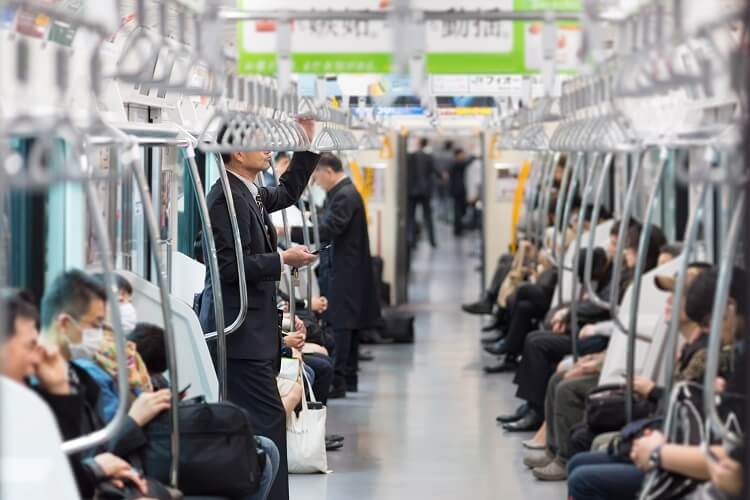At first, I had no idea what the cleaning lady was freaking out about, but she sure seemed to be having a hissy fit. It happened quite a few years ago when my brother visited us. We had taken him to a hot spring hotel so he could see a side of Japan he had never experienced before. As we were about to leave the room, he realized that he had forgotten something and stepped back up on the straw mat floor with his shoes on. Needless to say, it seemed like a sacrilege to the cleaning lady. He had made one of many cultural mistakes that the Japanese consider very rude.
I am sure you would never make the mistake of wearing shoes on the straw mat floors like my brother did. However, there are some rude behaviors that are specific to restaurants, riding on the trains, and interacting with people in public that you might not be aware of. In order to make your experience in Japan as positive as possible, you should know about these aspects of cultural etiquette.
Can I do this when I eat?
Some behaviors like slurping your noodles at the ramen shop are perfectly fine. Japanese people like slurping their food and cooks hear it as a compliment.  I’m proud to say that I’ve developed this habit and I hope you won’t be shocked if you hear me make a slurping sound if we get the chance to eat spaghetti together.
I’m proud to say that I’ve developed this habit and I hope you won’t be shocked if you hear me make a slurping sound if we get the chance to eat spaghetti together.
However, you do need to be more careful with your chopsticks. It is not appropriate to use your chopsticks to pass food to someone else, to move dishes closer to you, or to pick your teeth with them. One of the easiest mistakes to make is sticking your chopsticks up in your bowl of rice. Why not since it keeps your chopsticks from falling on the floor? Japanese people never do this except at funeral ceremonies or some form of honoring the dead. Because of this death-related tradition, sticking your chopsticks up in a bowl of rice in normal daily situations is very rude behavior.
 Whenever you have the chance to share a meal with Japanese friends, don’t pour a drink just for yourself. This is rude and somewhat selfish. Be sure to offer others first, or at least include them.
Whenever you have the chance to share a meal with Japanese friends, don’t pour a drink just for yourself. This is rude and somewhat selfish. Be sure to offer others first, or at least include them.
Someone asked if it is alright to not say anything when leaving a restaurant if you don’t speak Japanese. If you DO speak Japanese and you don’t say anything when you leave a restaurant, it is definitely rude because it carries the meaning that you were disappointed with the meal.
When leaving a restaurant, here are some words you can say that will show your politeness and etiquette:
- “Gochisosama” – This is the most commonly spoken expression after meals at home and at restaurants and basically means, “Thanks for the delicious meal.”
- “Oishikatta” – This expression means, “It was delicious,” and always makes the restaurant staff happy.
- “It was delicious!” – This can be said in English and can definitely suffice. The word “delicious” is commonly used by Japanese speakers and the customer’s meaning and intention can be understood and appreciated.
When paying for the bill, it is appropriate to put your cash or card on the little tray rather than handing it directly to the restaurant staff. They will then take the tray, process the transaction, and return your card or any change on the tray to you. This is the common way in other markets and even in convenience stores.
Finally, the concept of tipping cannot be left out when discussing restaurant behavior. Tipping is not done in Japan, so there’s no need to try. It comes across as weird. If you leave some money on the table, the wait staff may chase you down on the street to return it to you.
Don't talk so loudly
Riding the trains in Japan can sometimes seem like a library visit. Most people don’t speak on the trains and when they do, it’s with their inside voices. It’s common to see people either reading, looking at their phones, or sleeping (in upright positions).
Some travelers who don’t know about the expectations of behavior on trains may speak loudly to each other, speak on their phones rather than texting, and consume food and drink while traveling. These behaviors can definitely cause other passengers to think of you as a rude tourist.

What else is rude?
- Making a scene – No matter how frustrating or angry you might feel about a situation you face in public, it is definitely inappropriate to make a scene. Overall, people are calm and collected in public. Even if something feels unfair, handle it with respect and don’t lose your cool.
 Nose blowing – I don’t know how many times I’ve had a Japanese student in class sniffling with a runny nose. Why won’t they just blow their nose and be done with it? Well, blowing one’s nose in public is rude in Japanese culture. If it get’s too unbearable for them, they will ask to be excused to the restroom where they can blow their nose privately. So if you are in Japan sitting in a cafe or other public place, look for a restroom when you need to blow your nose.
Nose blowing – I don’t know how many times I’ve had a Japanese student in class sniffling with a runny nose. Why won’t they just blow their nose and be done with it? Well, blowing one’s nose in public is rude in Japanese culture. If it get’s too unbearable for them, they will ask to be excused to the restroom where they can blow their nose privately. So if you are in Japan sitting in a cafe or other public place, look for a restroom when you need to blow your nose.- Eating and drinking while walking – I’ll never forget how badly my mother-in-law scolded my wife several years ago for this. When she saw my wife walking on the sidewalk toward the house while eating an ice cream cone, she was beside herself. You would think my wife should have been arrested from listening to the scolding. While it is okay to do this in specific situations like at festivals, I learned that, in most cases, walking and eating at the same time is culturally inappropriate.
- Temiage – Whenever you visit anyone’s home, it is appropriate to take a small gift. Even just a small box of sweets is good, but forgetting to take something comes across as rude.
- PDA – You might be used to kissing or hugging the person you love in front of others, but it is not common at all in Japan. Beyond holding hands, public displays of affection are just not seen here. It is best to keep your your lips to yourself until you get back to your room.
Is there any hope for me?
I can’t count how many times I’ve made cultural mistakes and been rude here. I’ve handed and received gifts and business cards improperly. I’ve forgotten to show appreciation at culturally appropriate times. I’ve tried opening the door of the taxi when I wasn’t supposed to. I’ve even walked around a person’s home in the bathroom slippers because I forgot to change back to the regular slippers. Making cultural mistakes is embarrassing and frustrating.
The good news is that Japanese people are forgiving and helpful to foreigners visiting Japan. Learning from our mistakes is important and helps us learn more about the culture and the people. I’ve found that when I’m humble and apologetic about my mistakes, the people around me see that I’m willing to learn and respect the culture and values.
Have you noticed other cultural mistakes we need to watch out for? Share them here so we can all learn together!
 Nose blowing – I don’t know how many times I’ve had a Japanese student in class sniffling with a runny nose. Why won’t they just blow their nose and be done with it? Well, blowing one’s nose in public is rude in Japanese culture. If it get’s too unbearable for them, they will ask to be excused to the restroom where they can blow their nose privately. So if you are in Japan sitting in a cafe or other public place, look for a restroom when you need to blow your nose.
Nose blowing – I don’t know how many times I’ve had a Japanese student in class sniffling with a runny nose. Why won’t they just blow their nose and be done with it? Well, blowing one’s nose in public is rude in Japanese culture. If it get’s too unbearable for them, they will ask to be excused to the restroom where they can blow their nose privately. So if you are in Japan sitting in a cafe or other public place, look for a restroom when you need to blow your nose.